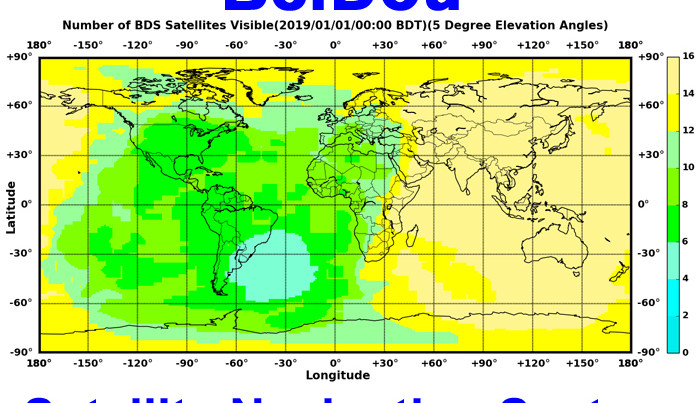China's BeiDou satellite positioning system goes live
January 08, 2019
on
on

Following on from the American GPS, Russian GloNaSS and the European Galileo satellite positioning systems, the Chinese have now fired up their own constellation called BeiDou which became operational over the last few days of 2018.
The system was originally scheduled to achieve full operational status in 2020 but that date has now been brought forward. The BeiDou (literally 'Big Dipper') system is able to achieve a 5 m positional accuracy in Eurasia and 10 m in the rest of the world. The signals can also be used to resolve velocity with an accuracy of 0.2 m/s = 0.72 km/h. The BeiDou constellation is currently made up of 33 satellites, which includes 15 of type 2 and 18 of the successor type 3. A further 12 satellites will eventually be added to the constellation to increase system accuracy and resolution.
Military systems increasingly rely on satellite positioning information. It is important that nations maintain an independent GPS constellation to ensure defence capability is not compromised in times of conflict. India is also in the process of establishing its own Indian Regional Navigation Satellite System (IRNSS) constellation — also known as NAVIC — but has been dogged by poor reliability of on-board atomic clock modules. The same modules have also proved troublesome in some of Galileo’s satellites.
The system was originally scheduled to achieve full operational status in 2020 but that date has now been brought forward. The BeiDou (literally 'Big Dipper') system is able to achieve a 5 m positional accuracy in Eurasia and 10 m in the rest of the world. The signals can also be used to resolve velocity with an accuracy of 0.2 m/s = 0.72 km/h. The BeiDou constellation is currently made up of 33 satellites, which includes 15 of type 2 and 18 of the successor type 3. A further 12 satellites will eventually be added to the constellation to increase system accuracy and resolution.
Military systems increasingly rely on satellite positioning information. It is important that nations maintain an independent GPS constellation to ensure defence capability is not compromised in times of conflict. India is also in the process of establishing its own Indian Regional Navigation Satellite System (IRNSS) constellation — also known as NAVIC — but has been dogged by poor reliability of on-board atomic clock modules. The same modules have also proved troublesome in some of Galileo’s satellites.
Read full article
Hide full article



Discussion (0 comments)